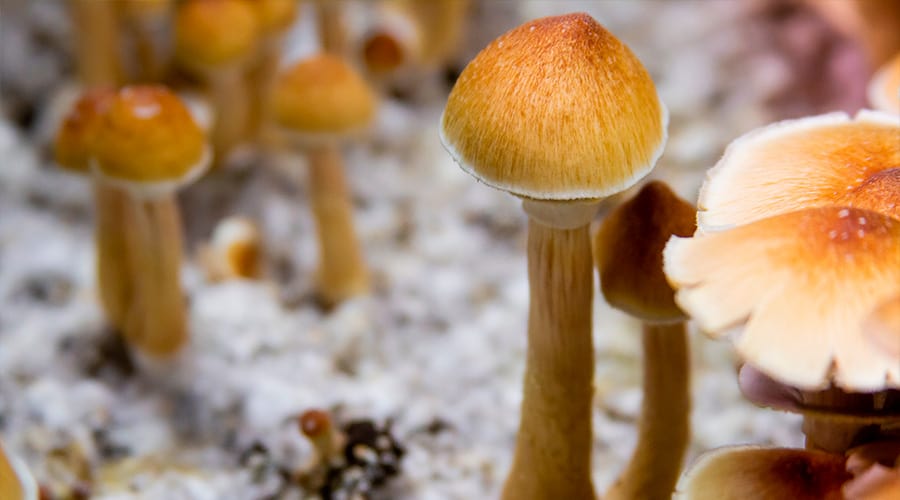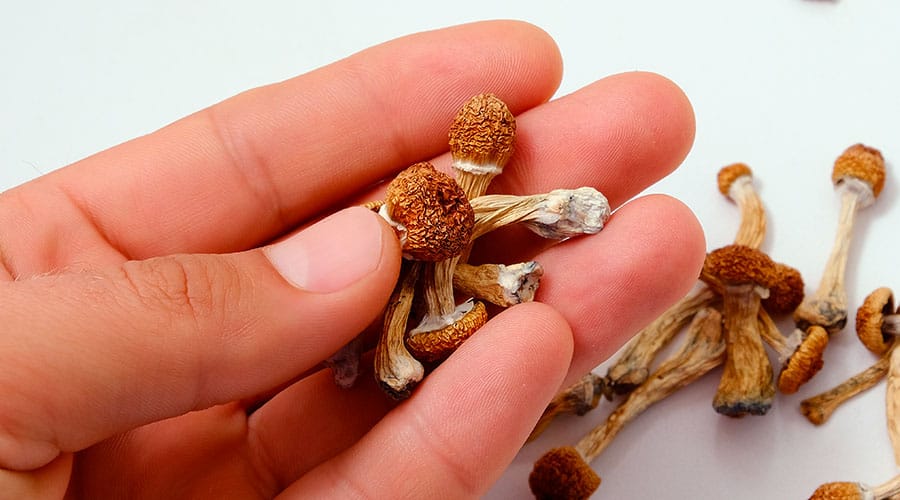Buy Dried Mushrooms New Jersey. Psilocybin mushrooms, sometimes known as magic mushrooms or shrooms, are among the most popular psychedelic substances worldwide. This in-depth guide will explain everything you need to know, including how to identify and use mushrooms, what to expect, and more.
What Are Magic Mushrooms? – Buy Dried Mushrooms New Jersey
The term “magic mushrooms” applies to any species of fungus that contains the active component psilocybin and related compounds, such as psilocin. But what is psilocybin, and how does it affect the body?

It is a chemical that has a somewhat similar molecular structure to serotonin. After ingestion, it breaks down into psilocin, which binds with serotonin receptors in the brain to induce a psychedelic experience, commonly known as a “trip.”
Humankind has used magic mushrooms for millennia as an important element of religious ceremonies and rituals. More recently, they have become popular for recreational use, and scientists are exploring their therapeutic potential.
What Kind of Mushrooms Get You High? – Buy Arylcyclohexylamine Drugs like Ketamine or Ketamine troches online in New Jersey
There are numerous types of magic mushrooms – over 180 species have been identified to date. Some of the most common types of magic mushrooms include:
- Psilocybe semilanceata (liberty caps)
- Psilocybe cubensis (golden caps, cubes)
- Psilocybe azurescens (flying saucers)
- Psilocybe cyanescens (wavy caps)
Their effects are similar, although some are far more potent than others. People who use them describe a heightened emotional state and an increased sense of introspection. Some users also experience time distortion and synesthesia, a phenomenon that involves blending the senses, for example, tasting colors.
Psilocybin can also cause visual effects. Shifting shapes and colors, halos or rainbows around objects, or geometric patterns when closing the eyes are common examples. There may be a sense that the world is pulsing or breathing, along with feelings of inner peace, contentment, or connection.
These effects can vary depending on the individual taking them, the setting, and the dosage.
There is also some variation in answer to the question, “how long does it take for shrooms to kick in?”. It generally takes 30 minutes to one hour, but this depends heavily on the person taking them, the consumption method, and the dosage.
How to Use Magic Mushrooms | Buy Dried Mushrooms New Jersey
Most people take magic mushrooms by eating them, although their taste and texture are rather unpleasant. Dried mushrooms are easier to consume than fresh and make dosing more accurate.
It is possible to air dry mushrooms, but it is best to use a dehydrator or a low oven with the door ajar to allow air circulation. Dehydration is also a great option when considering how to store magic mushrooms, as it significantly increases their shelf life.
To make magic mushrooms more palatable, people often brew them as tea, mix them with peanut butter or Nutella, make them into chocolates, or blend them into smoothies. It is also possible to grind dry mushrooms into a powder and make them into capsules. This method may be especially appropriate for those wishing to micro dose mushrooms for medicinal use.
Some people mix ground-up mushrooms with lemon juice, a method known as lemon tek. It is thought to speed up the trip’s onset and increase its intensity. In general, the stages of shrooms include the onset, the peak, and waves of varying intensity as the effects diminish. Lemon tek reportedly makes the whole experience faster, with a stronger peak and fewer waves on the comedown.
For those wondering, “can you smoke magic mushrooms?” the answer is that it is not a good idea. Inhaling magic mushroom smoke increases the risk of lung infections and is likely an ineffective ingestion method anyway.
Magic Mushrooms Medical Use

In recent years, numerous studies have emerged regarding magic mushrooms medical use. Some of the most robust evidence relates to psilocybin for anxiety, with end-of-life anxiety being one of the most researched areas.
Scientists are also looking into the effectiveness of microdosing for migraines and cluster headaches, which are notoriously difficult to treat.
Depression, obsessive-compulsive disorder (OCD), and tobacco addiction are other promising medical uses of psilocybin.
It also seems that it could assist the growth of new neural connections. Some people even believe that magic mushrooms played a crucial role in the evolution of the human brain, as described by Terence McKenna’s stoned ape theory.
Unfortunately, the Controlled Substance Act still classifies magic mushrooms as a Schedule 1 substance. Therefore, anyone wishing to try psilocybin for medical use may have difficulty accessing it. Individuals’ best course of action may be to investigate whether any clinical trials are ongoing in their area, or they can travel to retreat centers in places where psilocybin is legal.
How to Find Magic Mushrooms | Magic Mushrooms For Sale Sydney
The best growing environments for all kinds of fungi are those with rich nutrient sources and plenty of moisture. Therefore, magic mushrooms love to grow in forests where they can feed on the nutrients that dead trees provide. Species like Psilocybe cyanescens and Psilocybe azurescens grow on wood debris and are colloquially known as “wood lovers.”
Other species, such as Psilocybe semilanceata and Psilocybe cubensis, grow in open grassland, especially sheep and cow pastures. However, it is essential to avoid foraging for mushrooms on farmland that may harbor chemical pesticides.
It is also critical to only harvest when extremely confident about identifying shrooms. These fungi have many look-alikes, some of which are deadly poisonous.
Since there are so many varieties of magic mushrooms, it is unsurprising that they can vary significantly in appearance. Therefore, when considering how to identify psilocybin mushrooms, it is best to familiarize oneself with the varieties growing locally.
Psilocybe semilanceata grows in many regions, including North and South America, Europe, Asia, Australia, and New Zealand. They are small mushrooms with bell-shaped caps, hence their nickname: liberty caps.
Psilocybe cubensis is among the most common varieties in tropical regions worldwide. They are parasol-shaped mushrooms with stubby stems and light to golden-brown caps. The caps are bulbous when young and flatten out as the mushrooms mature.
Although these species are the most widespread, there are many other types of magic mushrooms, all with unique characteristics. What many of them have in common is that they bruise blue when picked or handled.
Mushrooms turning blue is often considered a key identification feature. However, it should not be relied upon in isolation and should only be used as a confirmation once the mushroom’s other features have been verified.
Growing Magic Mushrooms
One way to avoid a fatal foraging mistake is to cultivate mushrooms at home. Although the practice is widely illegal, some states have decriminalized magic mushrooms for personal use (see below). It is becoming a popular pastime, and there are many online guides dedicated to how to grow magic mushrooms.
Once you have your hands on some spores, the process is relatively straightforward with a bit of time, effort, and patience. Just be sure to check the latest laws in your area before embarking on your growing journey, as the penalties for illegal mushroom cultivation are potentially severe.
How Much Do Magic Mushrooms Cost? | Buy Dried Mushrooms New Jersey
If you are lucky enough to live somewhere with more liberal psilocybin laws, you might be able to buy magic mushrooms online.
There is no straightforward answer to the question “how much do shrooms cost?” as it varies depending on the area and amount purchased. The type of mushroom product and potency will also significantly influence the price.
What Is the Best Kind of Psychedelic Mushroom? – magic mushrooms online store in the USA
There are many different types of magic mushrooms, and all contain the same active compound: psilocybin. Therefore, it is difficult to say one is better than the others. However, some magic mushroom varieties have distinct advantages, such as being extraordinarily potent or quick and easy to grow.
Psilocybe cubensis, also known as golden cap mushrooms, are one of the most widely cultivated species. There are many different cubensis “strains,” including the famous golden teacher and penis envy mushrooms. While many consider these among the best cubensis strains, there are plenty of others to choose from.
Another consideration when looking for the best types of magic mushrooms is whether to choose mushrooms or truffles. Mushrooms are the part of the fungus that grows above ground, while truffles are an underground part of the organism.
Both mushrooms and truffles contain psilocybin and have somewhat similar effects. However, legality is one critical factor in the magic truffles vs. mushrooms debate. For example, truffles are legal in The Netherlands, but mushrooms are not.
Like mushrooms, there are many different types of truffles available. Philosopher’s stones are one of the most popular varieties.
How Long Does Psilocybin Stay in Your System | Magic Mushrooms For Sale North Carolina
One common concern is how long mushrooms stay in your system.
The good news is that the body metabolizes psilocybin relatively quickly, and it will be undetectable in most individuals after a couple of days. This is in stark contrast to other drugs, which can stay in your system for weeks or even months, as is the case for frequent cannabis users.
Magic Mushrooms Side Effects
According to scientific literature, psilocybin has a low risk of toxicity, addiction, or overdose. However, it can cause some adverse reactions. The most common mushroom side effects include:
- Changes in heart rate and blood pressure
- Nausea
- Sweating
- Tremors
- Increased tendon reflexes
- Dilated pupils
Other side effects of mushrooms include anxiety, panic attacks, paranoia, and mood swings. One can minimize the likelihood of these side effects occurring by preparing adequately and fostering a positive mindset before tripping.
Although it is rare, some people experience a condition called hallucinogen-persisting perception disorder (HPPD). This can cause altered perception for several weeks or months after using a psychedelic.
Wood lovers paralysis is another unusual side effect that can occur after taking wood-loving mushrooms like Psilocybe cyanescens and Psilocybe azurescens. It is temporary and not known to be harmful in the long term. However, it can be extremely distressing or dangerous if it occurs unexpectedly.
Finally, magic mushrooms can interact with several medications, especially those with psychoactive properties. It is unwise to take psychedelics alongside medications such as Adderall, Xanax, or SSRI antidepressants. Drinking alcohol and taking mushrooms at the same time can also produce adverse effects.
Additional Tips on Using Magic Mushrooms | Buy Dried Mushrooms New Jersey
Taking an appropriate dose of magic mushrooms is one of the keys to ensuring a positive experience.
While the effects of a particular dose often vary from person to person, many recommend first-time users start with a micro dose. More experienced mushroom users will often consume up to 5 grams or more at once. Such a large dose will typically produce intense psychoactive and hallucinogenic effects and may lead to paranoia for inexperienced users.
It is also critical to take mushrooms in a comfortable and safe setting while in a positive frame of mind. Having a close friend or professional act as a “trip sitter” can further enhance the event. They should preferably have experience with psychedelics and remain sober so they can act as a guide, alleviating any concerns that arise.
There are plenty of options when it comes to things to do on shrooms. However, it is every individual’s responsibility to ensure that they remain safe for the duration of their trip. Mushroom users should avoid putting themselves in potentially risky situations and stay in a comfortable and controlled environment while under the influence. USA Mushrooms Dispensary


